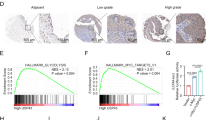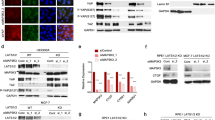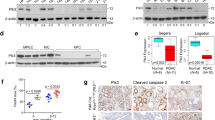Abstract
Upregulation of the embryonic M2 isoform of pyruvate kinase (PKM2) emerges as a critical player in the cancer development and metabolism, yet the underlying mechanism of PKM2 overexpression remains to be elucidated. Here we demonstrate that IGF-1/IGF-IR regulates PKM2 expression by enhancing HIF-1α-p65 complex binding to PKM2 promoter. PKM2 expression is regulated by miR-148a/152 suppression. PKM2 directly interacts with NF-κB p65 subunit to promote EGR1 expression for regulating miR-148a/152 feedback circuit in normal cells, but not in cancer cells because of the DNA hypermethylation of miR-148a and miR-152 gene promoters. The silencing of miR-148a/152 contributes to the overexpression of PKM2, NF-κB or/and IGF-IR in some cancer cells. We show that disruption of PKM2/NF-κB/miR-148a/152 feedback loop can regulate cancer cell growth and angiogenesis, and is also associated with triple-negative breast cancer (TNBC) phenotype, which may have clinical implication for providing novel biomarker(s) of TNBC and potential therapeutic target(s) in the future.
This is a preview of subscription content, access via your institution
Access options
Subscribe to this journal
Receive 50 print issues and online access
$259.00 per year
only $5.18 per issue
Buy this article
- Purchase on Springer Link
- Instant access to full article PDF
Prices may be subject to local taxes which are calculated during checkout








Similar content being viewed by others
References
Ferguson EC, Rathmell JC . New roles for pyruvate kinase M2: working out the Warburg effect. Trends Biochem Sci 2008; 33: 359–362.
Warburg O . On the origin of cancer cells. Science 1956; 123: 309–314.
Mazurek S, Eigenbrodt E . The tumor metabolome. Anticancer Res 2003; 23: 1149–1154.
Macintyre AN, Rathmell JC . PKM2 and the tricky balance of growth and energy in cancer. Mol Cell 2011; 42: 713–714.
Gao X, Wang H, Yang JJ, Liu X, Liu ZR . Pyruvate kinase M2 regulates gene transcription by acting as a protein kinase. Mol Cell 2012; 45: 598–609.
Lv L, Li D, Zhao D, Lin R, Chu Y, Zhang H et al. Acetylation targets the M2 isoform of pyruvate kinase for degradation through chaperone-mediated autophagy and promotes tumor growth. Mol Cell 2011; 42: 719–730.
Iqbal MA, Bamezai RN . Resveratrol inhibits cancer cell metabolism by down regulating pyruvate kinase M2 via inhibition of mammalian target of rapamycin. PLoS One 2012; 7: e36764.
Christofk HR, Vander Heiden MG, Harris MH, Ramanathan A, Gerszten RE, Wei R et al. The M2 splice isoform of pyruvate kinase is important for cancer metabolism and tumour growth. Nature 2008; 452: 230–233.
Yang W, Xia Y, Hawke D, Li X, Liang J, Xing D et al. PKM2 phosphorylates histone H3 and promotes gene transcription and tumorigenesis. Cell 2012; 150: 685–696.
Luo W, Hu H, Chang R, Zhong J, Knabel M, O'Meally R et al. Pyruvate kinase M2 is a PHD3-stimulated coactivator for hypoxia-inducible factor 1. Cell 2011; 145: 732–744.
Yang W, Xia Y, Cao Y, Zheng Y, Bu W, Zhang L et al. EGFR-induced and PKCepsilon monoubiquitylation-dependent NF-kappaB activation upregulates PKM2 expression and promotes tumorigenesis. Mol Cell 2012; 48: 771–784.
Kosugi M, Ahmad R, Alam M, Uchida Y, Kufe D . MUC1-C oncoprotein regulates glycolysis and pyruvate kinase M2 activity in cancer cells. PLoS One 2011; 6: e28234.
Tamada M, Nagano O, Tateyama S, Ohmura M, Yae T, Ishimoto T et al. Modulation of glucose metabolism by CD44 contributes to antioxidant status and drug resistance in cancer cells. Cancer Res 2012; 72: 1438–1448.
Sun Q, Chen X, Ma J, Peng H, Wang F, Zha X et al. Mammalian target of rapamycin up-regulation of pyruvate kinase isoenzyme type M2 is critical for aerobic glycolysis and tumor growth. Proc Natl Acad Sci USA 2011; 108: 4129–4134.
Kefas B, Comeau L, Erdle N, Montgomery E, Amos S, Purow B . Pyruvate kinase M2 is a target of the tumor-suppressive microRNA-326 and regulates the survival of glioma cells. Neuro Oncol 2010; 12: 1102–1112.
Jung CJ, Iyengar S, Blahnik KR, Ajuha TP, Jiang JX, Farnham PJ et al. Epigenetic modulation of miR-122 facilitates human embryonic stem cell self-renewal and hepatocellular carcinoma proliferation. PLoS One 2011; 6: e27740.
Pollak M . Insulin and insulin-like growth factor signalling in neoplasia. Nat Rev Cancer 2008; 8: 915–928.
Mitsiades CS, Mitsiades NS, McMullan CJ, Poulaki V, Shringarpure R, Akiyama M et al. Inhibition of the insulin-like growth factor receptor-1 tyrosine kinase activity as a therapeutic strategy for multiple myeloma, other hematologic malignancies, and solid tumors. Cancer Cell 2004; 5: 221–230.
Guler HP, Zapf J, Froesch ER . Short-term metabolic effects of recombinant human insulin-like growth factor I in healthy adults. N Engl J Med 1987; 317: 137–140.
Xu Q, Jiang Y, Yin Y, Li Q, He J, Jing Y et al. A regulatory circuit of miR-148a/152 and DNMT1 in modulating cell transformation and tumor angiogenesis through IGF-IR and IRS1. J Mol Cell Biol 2013; 5: 3–13.
Zhang R, Li M, Zang W, Chen X, Wang Y, Li P et al. MiR-148a regulates the growth and apoptosis in pancreatic cancer by targeting CCKBR and Bcl-2. Tumour Biol 2014; 35: 837–844.
Liu X, Zhan Z, Xu L, Ma F, Li D, Guo Z et al. MicroRNA-148/152 impair innate response and antigen presentation of TLR-triggered dendritic cells by targeting CaMKIIalpha. J Immunol 2010; 185: 7244–7251.
Zhang H, Li Y, Huang Q, Ren X, Hu H, Sheng H et al. MiR-148a promotes apoptosis by targeting Bcl-2 in colorectal cancer. Cell Death Differ 2011; 18: 1702–1710.
Liu C, Rangnekar VM, Adamson E, Mercola D . Suppression of growth and transformation and induction of apoptosis by EGR-1. Cancer Gene Ther 1998; 5: 3–28.
Portales-Casamar E, Thongjuea S, Kwon AT, Arenillas D, Zhao X, Valen E et al. JASPAR 2010: the greatly expanded open-access database of transcription factor binding profiles. Nucleic Acids Res 2010 38: D105–D110.
Lehmann U, Hasemeier B, Christgen M, Muller M, Romermann D, Langer F et al. Epigenetic inactivation of microRNA gene hsa-mir-9-1 in human breast cancer. J Pathol 2008; 214: 17–24.
Thyss R, Virolle V, Imbert V, Peyron JF, Aberdam D, Virolle T . NF-kappaB/Egr-1/Gadd45 are sequentially activated upon UVB irradiation to mediate epidermal cell death. EMBO J 2005; 24: 128–137.
Hitosugi T, Kang S, Vander Heiden MG, Chung TW, Elf S, Lythgoe K et al. Tyrosine phosphorylation inhibits PKM2 to promote the Warburg effect and tumor growth. Sci Signal 2009; 2: ra73.
Christofk HR, Vander Heiden MG, Wu N, Asara JM, Cantley LC . Pyruvate kinase M2 is a phosphotyrosine-binding protein. Nature 2008; 452: 181–186.
Yang W, Xia Y, Ji H, Zheng Y, Liang J, Huang W et al. Nuclear PKM2 regulates beta-catenin transactivation upon EGFR activation. Nature 2011; 480: 118–122.
Kitamura K, Hatano E, Higashi T, Narita M, Seo S, Nakamoto Y et al. Proliferative activity in hepatocellular carcinoma is closely correlated with glucose metabolism but not angiogenesis. J Hepatol 2011; 55: 846–857.
Schmidt M, Voelker HU, Kapp M, Krockenberger M, Dietl J, Kammerer U . Glycolytic phenotype in breast cancer: activation of Akt, up-regulation of GLUT1, TKTL1 and down-regulation of M2PK. J Cancer Res Clin Oncol 2010; 136: 219–225.
Badve S, Dabbs DJ, Schnitt SJ, Baehner FL, Decker T, Eusebi V et al. Basal-like and triple-negative breast cancers: a critical review with an emphasis on the implications for pathologists and oncologists. Mod Pathol 2011; 24: 157–167.
Takahashi M, Cuatrecasas M, Balaguer F, Hur K, Toiyama Y, Castells A et al. The clinical significance of MiR-148a as a predictive biomarker in patients with advanced colorectal cancer. PLoS One 2012; 7: e46684.
Schultz NA, Andersen KK, Roslind A, Willenbrock H, Wojdemann M, Johansen JS . Prognostic microRNAs in cancer tissue from patients operated for pancreatic cancer – five microRNAs in a prognostic index. World J Surg 2012; 36: 2699–2707.
Kwon OH, Kang TW, Kim JH, Kim M, Noh SM, Song KS et al. Pyruvate kinase M2 promotes the growth of gastric cancer cells via regulation of Bcl-xL expression at transcriptional level. Biochem Biophys Res Commun 2012; 423: 38–44.
Acknowledgements
This work was supported in part by National Natural Science Foundation of China (81320108019, 81270736, 81071642), by Jiangsu Province Clinical Science and Technology Project (BL2012008), the Priority Academic Program Development of Jiangsu Higher Education Institutions (JX10231801), Jiangsu Province’s Key Discipline of Medicine (XK201117), and by National Institutes of Health grants R01ES020868 and R21CA175975.
Author information
Authors and Affiliations
Corresponding authors
Ethics declarations
Competing interests
The authors declare no conflict of interest.
Additional information
Supplementary Information accompanies this paper on the Oncogene website
Supplementary information
Rights and permissions
About this article
Cite this article
Xu, Q., Liu, LZ., Yin, Y. et al. Regulatory circuit of PKM2/NF-κB/miR-148a/152-modulated tumor angiogenesis and cancer progression. Oncogene 34, 5482–5493 (2015). https://doi.org/10.1038/onc.2015.6
Received:
Revised:
Accepted:
Published:
Issue Date:
DOI: https://doi.org/10.1038/onc.2015.6
This article is cited by
-
Tetramerization of pyruvate kinase M2 attenuates graft-versus-host disease by inhibition of Th1 and Th17 differentiation
Human Cell (2024)
-
CircSTAM inhibits migration and invasion of trophoblast cells by regulating miR-148a-5p/PTEN axis
Journal of Assisted Reproduction and Genetics (2023)
-
MicroRNA-mediated reprogramming of glucose, fatty acid and amino acid metabolism in cancer
Genome Instability & Disease (2022)
-
Decoding Insulin-Like Growth Factor Signaling Pathway From a Non-coding RNAs Perspective: A Step Towards Precision Oncology in Breast Cancer
Journal of Mammary Gland Biology and Neoplasia (2022)
-
TBX15/miR-152/KIF2C pathway regulates breast cancer doxorubicin resistance via promoting PKM2 ubiquitination
Cancer Cell International (2021)



